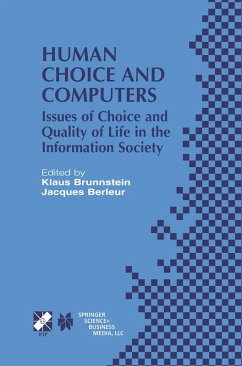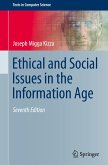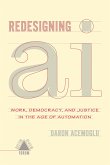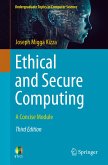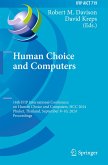Human Choice and Computers
Issues of Choice and Quality of Life in the Information Society
Herausgegeben:Brunnstein, Klaus; Berleur, Jacques
Human Choice and Computers
Issues of Choice and Quality of Life in the Information Society
Herausgegeben:Brunnstein, Klaus; Berleur, Jacques
- Broschiertes Buch
- Merkliste
- Auf die Merkliste
- Bewerten Bewerten
- Teilen
- Produkt teilen
- Produkterinnerung
- Produkterinnerung
Human Choice and Computers: Issues of Choice and Quality of Life in the Information Society presents different views about how terrorist actions are influencing political and social discussions and decisions, and it covers questions related to legitimacy and power in the Information Society. Ethical principles are important guidelines for responsible behavior of IT professionals. But even under strong external pressure, long ranging aspects such as education and the roles of developing countries in the Information Society are important to discuss, especially to enable all to actively participate in information processes. …mehr
Andere Kunden interessierten sich auch für
![Ethical and Social Issues in the Information Age Ethical and Social Issues in the Information Age]() Joseph Migga KizzaEthical and Social Issues in the Information Age41,99 €
Joseph Migga KizzaEthical and Social Issues in the Information Age41,99 €![Ethical and Social Issues in the Information Age Ethical and Social Issues in the Information Age]() Joseph Migga KizzaEthical and Social Issues in the Information Age56,99 €
Joseph Migga KizzaEthical and Social Issues in the Information Age56,99 €![Ethical and Social Issues in the Information Age Ethical and Social Issues in the Information Age]() Joseph Migga KizzaEthical and Social Issues in the Information Age35,99 €
Joseph Migga KizzaEthical and Social Issues in the Information Age35,99 €![Computers and Networks in the Age of Globalization Computers and Networks in the Age of Globalization]() Computers and Networks in the Age of Globalization153,99 €
Computers and Networks in the Age of Globalization153,99 €![Redesigning AI Redesigning AI]() Daron Acemoglu Et AlRedesigning AI15,99 €
Daron Acemoglu Et AlRedesigning AI15,99 €![Ethical and Secure Computing Ethical and Secure Computing]() Joseph Migga KizzaEthical and Secure Computing41,99 €
Joseph Migga KizzaEthical and Secure Computing41,99 €![Human Choice and Computers Human Choice and Computers]() Human Choice and Computers60,99 €
Human Choice and Computers60,99 €-
-
-
Human Choice and Computers: Issues of Choice and Quality of Life in the Information Society presents different views about how terrorist actions are influencing political and social discussions and decisions, and it covers questions related to legitimacy and power in the Information Society. Ethical principles are important guidelines for responsible behavior of IT professionals. But even under strong external pressure, long ranging aspects such as education and the roles of developing countries in the Information Society are important to discuss, especially to enable all to actively participate in information processes.
Produktdetails
- Produktdetails
- IFIP Advances in Information and Communication Technology 98
- Verlag: Springer / Springer US / Springer, Berlin
- Artikelnr. des Verlages: 978-1-4757-5429-2
- Softcover reprint of the original 1st ed. 2002
- Seitenzahl: 348
- Erscheinungstermin: 5. März 2013
- Englisch
- Abmessung: 235mm x 155mm x 19mm
- Gewicht: 528g
- ISBN-13: 9781475754292
- ISBN-10: 1475754299
- Artikelnr.: 39560204
- Herstellerkennzeichnung
- Springer-Verlag GmbH
- Tiergartenstr. 17
- 69121 Heidelberg
- ProductSafety@springernature.com
- IFIP Advances in Information and Communication Technology 98
- Verlag: Springer / Springer US / Springer, Berlin
- Artikelnr. des Verlages: 978-1-4757-5429-2
- Softcover reprint of the original 1st ed. 2002
- Seitenzahl: 348
- Erscheinungstermin: 5. März 2013
- Englisch
- Abmessung: 235mm x 155mm x 19mm
- Gewicht: 528g
- ISBN-13: 9781475754292
- ISBN-10: 1475754299
- Artikelnr.: 39560204
- Herstellerkennzeichnung
- Springer-Verlag GmbH
- Tiergartenstr. 17
- 69121 Heidelberg
- ProductSafety@springernature.com
Critical Professional Discourses About Information and Communications Technologies and Social Life in the U.S..- Does the Internet Promote Democracy?.- Theoretical Perspective on the Interplay Between ICT and Quality of Life.- Using Technology to Help the Citizen Enrollment.- Information and Communication Technology and the Home Environment.- Some Great Myths of the History of Computing.- Roots of Computing in Austria - Contributions of the IBM Vienna Laboratory and Changes of Paradigms and Priorities in Information Technology.- Self-regulation: Content, Legitimacy and Efficiency - Governance and Ethics.- Trust, Corruption, and Surveillance in the Electronic Workplace.- Ethics and Learning - From State Regulation towards Reflexive Self-Regulation of the Information Society.- Computer Augmented Research and Scientific Misconduct.- The Security Aspect of Information Society as a Global Biocultural System.- Choice and Responsibility: The Delegation of Decision Making to Intelligent Software Agents.- Responsibility and the Work of IT-Professionals: From Academia to Practice.- Is the Enemy Us? - New Threats to Privacy, Freedom of Information and Civil Liberties in the Age of Terrorism.- National Identification Schemes (Nids): A Remedy Against Terrorist Attack?.- A Classification of Biometric Applications Wanted by Politics: Passports, Person Tracking and Fight Against Terror.- Preventing Privacy Attacks and CyberCrime in the Mobile Internet?.- Towards a Framework for Sustainable Knowledge Management in Organisations in Developing Countries.- Adapting Global Practices Locally: A Perspective on IT Implementation in a Developing Country Context.- Technology and Learning Societies in the New Millennium (Indian Context): Content, Practice and Management.- Quality ofWorking Life, Knowledge-Intensive Work Processes and Creative Learning Organisations: Information Processing Paradigm versus Self-Organisation Theory.- Understanding the Process of Information Systems and ICT Curriculum Development. Three Models.- Cultural Differences of Female Enrollment in Tertiary Education in Computer Science.- A Radical Scandinavian (" Øresundsk") Approach to Inquiring Organizations - A Critique of ICT in Knowledge Management Martina.- Sustainable Development and the Information Society.- "Information for All" Programme.- Draft Recommendations "Concerning the Promotion and Use of Multilingualism and Universal Access to Cyberspace".
Critical Professional Discourses About Information and Communications Technologies and Social Life in the U.S..- Does the Internet Promote Democracy?.- Theoretical Perspective on the Interplay Between ICT and Quality of Life.- Using Technology to Help the Citizen Enrollment.- Information and Communication Technology and the Home Environment.- Some Great Myths of the History of Computing.- Roots of Computing in Austria - Contributions of the IBM Vienna Laboratory and Changes of Paradigms and Priorities in Information Technology.- Self-regulation: Content, Legitimacy and Efficiency - Governance and Ethics.- Trust, Corruption, and Surveillance in the Electronic Workplace.- Ethics and Learning - From State Regulation towards Reflexive Self-Regulation of the Information Society.- Computer Augmented Research and Scientific Misconduct.- The Security Aspect of Information Society as a Global Biocultural System.- Choice and Responsibility: The Delegation of Decision Making to Intelligent Software Agents.- Responsibility and the Work of IT-Professionals: From Academia to Practice.- Is the Enemy Us? - New Threats to Privacy, Freedom of Information and Civil Liberties in the Age of Terrorism.- National Identification Schemes (Nids): A Remedy Against Terrorist Attack?.- A Classification of Biometric Applications Wanted by Politics: Passports, Person Tracking and Fight Against Terror.- Preventing Privacy Attacks and CyberCrime in the Mobile Internet?.- Towards a Framework for Sustainable Knowledge Management in Organisations in Developing Countries.- Adapting Global Practices Locally: A Perspective on IT Implementation in a Developing Country Context.- Technology and Learning Societies in the New Millennium (Indian Context): Content, Practice and Management.- Quality ofWorking Life, Knowledge-Intensive Work Processes and Creative Learning Organisations: Information Processing Paradigm versus Self-Organisation Theory.- Understanding the Process of Information Systems and ICT Curriculum Development. Three Models.- Cultural Differences of Female Enrollment in Tertiary Education in Computer Science.- A Radical Scandinavian (" Øresundsk") Approach to Inquiring Organizations - A Critique of ICT in Knowledge Management Martina.- Sustainable Development and the Information Society.- "Information for All" Programme.- Draft Recommendations "Concerning the Promotion and Use of Multilingualism and Universal Access to Cyberspace".

